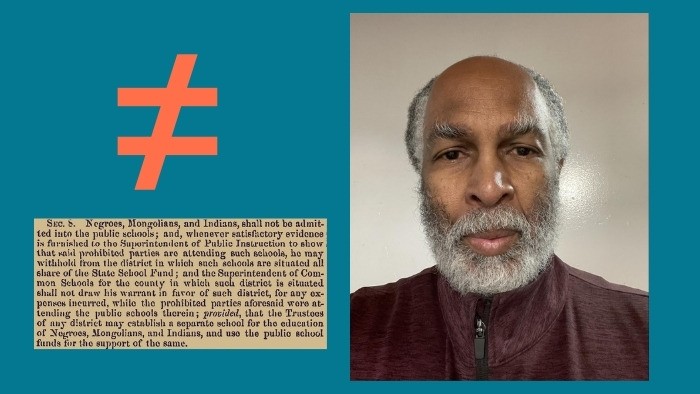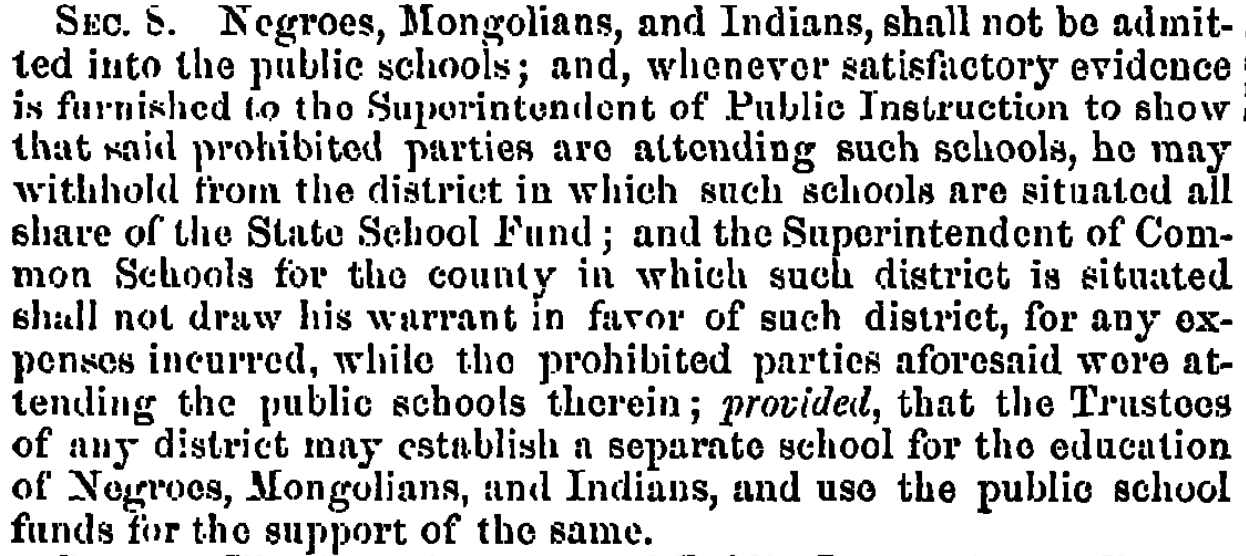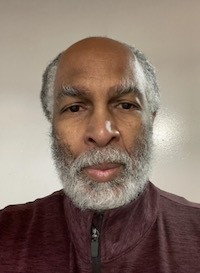Black history and education

Unequal
In life, no one starts at the finish line. Getting to the top is like climbing a cactus. You can get there, but it's gonna hurt.
That's Black history in the United States. It's the story of overcoming discriminatory public policy. Opening doors to opportunity. Taking a seat. And rising to the top.
When you reach my age and look back on your life, you can clearly see three things that matter the most:
- What you do for a living; your job or profession
- Who you marry or have as a partner (and your family)
- What you did with/about your education.
What determines these? Education. A great education will determine where you live, who you marry, and what you do for a living.
Education, as we now engage in it, didn't even exist 100 years ago. In fact, "education" is not mentioned at all in the United States Constitution. It was left to the states, including California, to work out under the broad terms of the 14th amendment.
California’s racist beginning
California declared itself a “free” state at its founding in 1850, a move that destabilized the Missouri Compromise and helped trigger the Civil War. Even so, California, like many other states, has a sordid history of discrimination in education. For many years “Negroes, Mongolians and Indians” were not allowed to attend public school in California. They had to go to separate schools.
The excerpt below from the California Common Schools Act of 1860 does not mince words:
Chap. CCCXXIX - An Act amendatory of, and supplementary to, “An Act to Establish, Support, and Regulate, Common Schools, and to Repeal former Acts concerning the same,” approved May third, one thousand eight hundred and fifty-five” [Approved April 28, 1860]
Sec. 8. Negroes, Mongolians, and Indians, shall not be admitted into the public schools; and, whenever satisfactory evidence is furnished to the Superintendent of Public Instruction to show that said prohibited parties are situated all share of the State School Fund; and the Superintendent of Common Schools for the county in which such district is situated shall not draw his warrant in favor of such district, for any expenses incurred, while the prohibited parties aforesaid were attending the public schools therein; provided, that the Trustees of any district may establish a separate school for the education of Negroes, Mongolians, and Indians, and use the public school funds for the support of the same.

Starting in the 1870s, lawsuits brought by African American, Chinese American and Mexican American parents pushed California to change education policy. The original policy of “only whites” in public schools changed to separate but equal public schools.
It took decades of lawsuits and then a US Supreme Court decision in 1954, Brown v. Board of Education, to ensure that all students have the right to attend integrated public schools. Here are some of the California milestones:
|
California Case |
Summary |
Legal ruling |
|---|---|---|
|
1872 |
An African American parent sued to let her child attend a white school in San Francisco. She lost. The California Supreme Court upheld separate schools for African American children. |
“So far as they are concerned, no rule of equality is violated — for while they are excluded from the schools for the white, the white are excluded from the school provided for the negro.” |
|
1885 |
A Chinese parent sued to let her child attend another white school in San Francisco. The parent won. The Supreme Court of California held the school must admit the student. But then… the California State Assembly enacted Bill 268 to establish separate schools for children of “Mongolian or Chinese” descent. After that, Chinese children were not admitted into any other schools. |
“...in this case, if effect be given to the intention of the legislature, as indicated by the clear and unambiguous language used by them, respondent here has the same right to enter a public school that any other child has.” |
|
1946 |
Sylvia Mendez’s father sued four Los Angeles school districts when she was denied entry to a white public school. And she won! This lawsuit was a precursor to the US Supreme Court case, Brown v. Board of Education, which used the same legal strategies and the same lawyer, Thurgood Marshall. |
“A paramount requisite in the American system of public education is social equality. It must be open to all children…regardless of lineage.” |
We must cherish these hard-earned rights. Black history is not just about slavery and restrictive covenants and closed lunch counters. It’s also the history of spectacular inventions and discoveries.
Black History Month
Black History Month is a celebration of what all Americans should cherish. It's the story of the rewards for hard work and talent and the benefits of education.
Those of us who grew up in the sixties and seventies remember two songs - "Say It Loud, I'm Black and I'm Proud", by James Brown, and "Young, Gifted and Black", by Aretha Franklin. I liked Nina Simone's version better.
So, here we are, in 2022. I'm proud of the achievements of African Americans. As we go forward, I sincerely wish that our schools — elementary, middle and high — will focus on and celebrate our present black heroes and role models. Acknowledge the past, but don't get stuck there.
Who are these role models? Some you know, others you might not:
|
Role models you probably know |
|
|---|---|
|
Kamala Harris |
First Woman & First African American Vice President of the U.S. |
|
Barack Obama |
44th president of the United States |
|
Condoleezza Rice |
Former United States Secretary of State |
|
Oprah Winfrey |
Billionaire and American media leader |
|
Can you name these people? |
|
|
? |
Former CEO & Chairman, American Express |
|
? |
First Black Woman CEO of Walgreens |
|
? |
President of the University of California |
|
? |
President, Ford Foundation |
|
? |
United States Secretary of Defense |
|
? |
CEO, Lowe's |
Education has opened doors for so many. But as I say to my high school granddaughter: “Opportunity doesn’t knock — it only opens when you knock.”
 Rex Ridgeway is Vice-Chairman of the Citizens Bond Oversight Committee of San Francisco Unified School District and Vice-Chairman of the School Site Council of Abraham Lincoln High School. He worked 20 years as a real estate investor, 10 years in finance as a broker and investor, and 8 years as a financial auditor.
Rex Ridgeway is Vice-Chairman of the Citizens Bond Oversight Committee of San Francisco Unified School District and Vice-Chairman of the School Site Council of Abraham Lincoln High School. He worked 20 years as a real estate investor, 10 years in finance as a broker and investor, and 8 years as a financial auditor.
Tags on this post
Equity History DiversityAll Tags
A-G requirements Absences Accountability Accreditation Achievement gap Administrators After school Algebra API Arts Assessment At-risk students Attendance Beacon links Bilingual education Bonds Brain Brown Act Budgets Bullying Burbank Business Career Carol Dweck Categorical funds Catholic schools Certification CHAMP Change Character Education Chart Charter schools Civics Class size CMOs Collective bargaining College Common core Community schools Contest Continuous Improvement Cost of education Counselors Creativity Crossword CSBA CTA Dashboard Data Dialogue District boundaries Districts Diversity Drawing DREAM Act Dyslexia EACH Early childhood Economic growth EdPrezi EdSource EdTech Education foundations Effort Election English learners Equity ESSA Ethnic studies Ethnic studies Evaluation rubric Expanded Learning Facilities Fake News Federal Federal policy Funding Gifted Graduation rates Grit Health Help Wanted History Home schools Homeless students Homework Hours of opportunity Humanities Independence Day Indignation Infrastructure Initiatives International Jargon Khan Academy Kindergarten LCAP LCFF Leaderboard Leadership Learning Litigation Lobbyists Local control Local funding Local governance Lottery Magnet schools Map Math Media Mental Health Mindfulness Mindset Myth Myths NAEP National comparisons NCLB Nutrition Pandemic Parcel taxes Parent Engagement Parent Leader Guide Parents peanut butter Pedagogy Pensions personalized Philanthropy PISA Planning Policy Politics population Poverty Preschool Prezi Private schools Prize Project-based learning Prop 13 Prop 98 Property taxes PTA Purpose of education puzzle Quality Race Rating Schools Reading Recruiting teachers Reform Religious education Religious schools Research Retaining teachers Rigor School board School choice School Climate School Closures Science Serrano vs Priest Sex Ed Site Map Sleep Social-emotional learning Song Special ed Spending SPSA Standards Strike STRS Student motivation Student voice Success Suicide Summer Superintendent Suspensions Talent Taxes Teacher pay Teacher shortage Teachers Technology Technology in education Template Test scores Tests Time in school Time on task Trump Undocumented Unions Universal education Vaccination Values Vaping Video Volunteering Volunteers Vote Vouchers Winners Year in ReviewSharing is caring!
Password Reset
Search all lesson and blog content here.
Login with Email
We will send your Login Link to your email
address. Click on the link and you will be
logged into Ed100. No more passwords to
remember!














Questions & Comments
To comment or reply, please sign in .